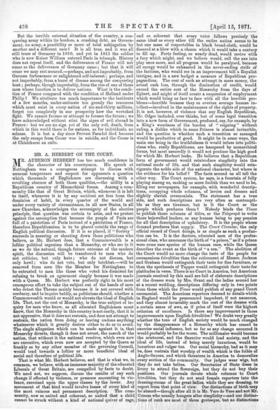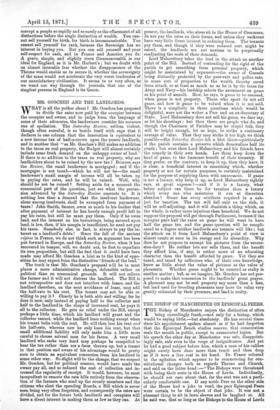MR. A. HERBERT ON THE COURT.
MR. AUBERON HERBERT has too much confidence in _111 the character of his countrymen. His speech at Nottingham was a courageous attempt to discuss with unusual temperance and respect for opponents a question which thousands of Englishmen are discussing with a revolting absence of both those qualities,—the utility in a Republican country of Monarchical forms. Among a com- munity like that of Great Britain, which, whenever it is left to itself, whenever it is by any accident set free from the dominion of habit, in every quarter of the world and under every variety of circumstance, in all new States, in all new Churches, acknowledges the sovereignty of the elective principle, that question was certain to arise, and we protest against the assumption that because the people of Paris are full of a patriotism of Paris instead of a patriotism of France, therefore Republicanism is to be placed outside the range of English political discussion. If it is so placed, if " Society succeeds in sneering or shouting down those politicians who believe, as Mr. Herbert does, that a Commonwealth is a loftier political organism than a Monarchy, or who see in it as we do the natural, though future outcome of the modern spirit, the discussion will be transferred to men who do not criticize, but only hate ; who do not discuss, but only howl ; who do not vote, but only brickbat,—will be removed from men like the Member for Nottingham to be entrusted to men like those who voted his dismissal for refusing to break an agreement simply because it was made with a Queen. Mr. Herbert was perfectly right in his most courageous effort to take the subject out of the hands of men who detest the Throne mainly because it is not covered with corduroy, and to inquire boldly, as politicians should, whether a Commonwealth would or would not elevate the ideal of English life. That, not the cost of Monarchy, is the true subject of in- quiry for men who know, as all educated Englishmen must know, that the Monarchy in this country is not costly, that it is not oppressive, that it does not restrain, and does not attempt to restrain, the nation from doing or leaving undone anything whatsoever which it greatly desires either to do or to avoid. The single allegation which can be made against it is, that Monarchy diverts, though it does not arrest, the march of the nation, that without it the national resolves, which even now are executive, which even now are accepted by the Queen as frankly as by any other member of the governing Council, would tend towards a loftier or more beneficial ideal of social and therefore of political life.
That is what Mr. Herbert believes, and that is what we, in common, we believe, with an immense majority of the educated Liberals of Great Britain, are compelled by facts to doubt.
We need not, we suppose, discuss the results of any such change if effected by violence, or pressure amounting to vio- lence, exercised upon the upper classes by the lower. Any movement of that kind would involve losses of every kind of the most ruinous and permanent description. The com- munity, now so united and coherent, so united that a child cannot be struck without a kind of national quiver of rage,
and so coherent that every voter follows precisely the same ideal as every other till the entire nation seems to be but one mass of respectables in black broad-cloth, would be fissured at a blow with a chasm which it would take a century to fill up. Party feeling, so nearly dead, would revive with a fury which might, and we believe would, call the axe into play once more, and all progress would be paralyzed, because all energy would be exhausted in the never-ending strife of the factions, who would see in an improvement bill a Royalist intrigue, and in a new budget a measure of Republican pro- pagandism. The cost of such an attempt in mere money, the actual cash loss, through the diminution of credit, would exceed the entire cost of the Monarchy from the days of Egbert, and might of itself create a suspension of employment which would bring us face to face with all the horrible pro- blems—horrible because they so overtax average human in- tellect—involved in the maintenance of the rights of property. It is not, however, of violence that any English Republican, Mr. Odger included, ever thinks, but of some legal transition into a new form of Government, produced, say, for example, by a King's weariness of the burden of " reigning " without ruling, a dislike which in some Princes is almost invincible, and the question is whether such a transition so managed would be productive of good. It might be in some ways, the main one being in the truthfulness it would infuse into politi- cians who, really Republicans, are hampered by monarchical forms, but most assuredly it would not produce the high good for which Mr. Herbert looks. He believes that a Republican form of government would reintroduce simplicity into the national mode of life, and that such simplicity would rein- vigorate the noble side of the national character, but where is the evidence for his belief ? The facts around us all tell the other way. The Court system, he says, is a fountain of folly playing among us, making us more foolish than we need to be, filling our newspapers, for example, with wonderful descrip- tions, occupying whole columns, of levees and dresses and slightly slavish ceremonials. The statement has a true side, and such descriptions are very often as contempti- ble as they are tiresome, but is it the Court or the people which produces them ? Nobody binds the Times to publish those columns of titles, or the Telegraph to write those bejewelled leaders, or any human being to pay pennies for all that description of upholstery. It is the people whose demand produces that supply. The Court Circular, the only official record of Court doings, is as simple as such a produc- tion can be. It is the doctors, educated men of the profes- sional class, who announce the birth of " a prince," as if a prince were some rare species of the human race, while the Queen describes the event as the birth of " a son." The abolition of the Court would no more change the taste of the people for ceremonious frivolities than the retirement of Messrs. Jackson and Graham would extinguish their taste for fine furniture, or than the apotheosis of Tupper would extinguish their taste for platitudes in verse. There is no Court in America, but American journals received by this mail are full of elaborate descriptions of the dresses worn by Mrs. Grant and the ladies around her at a recent wedding, descriptions differing only in two points from those which the Times would publish of any grand Court ceremonial. The American reporters descend to details which in England would be pronounced impudent, if not nauseous, and they almost invariably mark the cost of the dresses with a certain sense of awe, as if price of itself were the highest criterion of excellence. Is there any improvement in those improvements upon English frivolities ? We doubt very greatly whether the tone of English society would be much changed by the disappearance of a Monarchy which has ceased to exercise social influence, but so far as any change occurred it would probably be for the worse. The millionaire would become the aristocrat, and the financier would lead society, and the ideal of life, instead of being merely luxurious, would be luxurious and vulgar too. Our social hierarchy, bad as it may be, does restrain that worship of wealth which is the foible of Anglo-Saxons, and which threatens in America to demoralize every section of the community. Our judges wear wigs, but they do not take bribes. Our Secretaries of State dress in livery to attend the Sovereign, but they do not buy their positions. Our journals devote whole columns to Court frivolities, but they do not send female reporters into the dressing-rooms of the great ladies, while they are dressing, to report from that point of view. Our distinctions of birth may be absurd—though after all it is Mr. Vere de Vere and not Mr. Crcesus who usually hungers after simplicity—and our distinc- tions of rank are most of them grotesque, but no distinctions corrupt a people so rapidly and so surely as the effacement of all distinctions before the single distinction of wealth. You can- not sell yourself for birth, for birth is incommunicable. You cannot sell yourself for rank, because the Sovereign has no interest in buying you. But you can sell yourself and your self-respect for cash, and in France and America you do. A grave, simple, and slightly stern Commonwealth is our ideal for England, as it is Mr. Herbert's ; but we doubt with an almost incurable fear whether the disappearance of the Throne would enable us to secure it, whether the sovereignty of the mass would not accelerate the very worst tendencies of our unsatisfactory civilization. It seems to us very often, as we wend our way through the journals, that one of the simplest persons in England is its Queen.



































 Previous page
Previous page